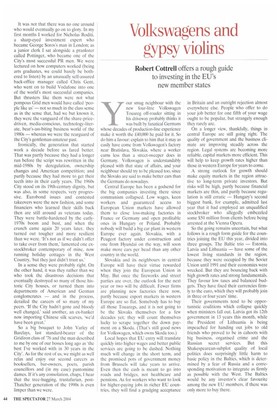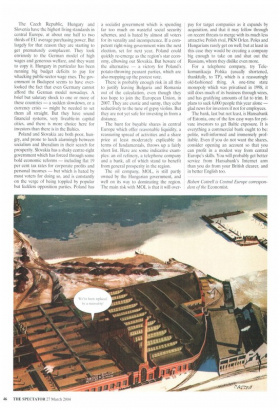Volkswagens and gypsy violins
Robert Cottrell offers a rough guide to investing in the EU's new member states y. our smug neighbour with the new four-litre Volkswagen Touareg off-roader sitting in his driveway probably thinks it was built by fanatical Germans whose decades of production-line experience make it worth the £40,000 he paid for it. So do him a favour: explain to him that it may as easily have come from Volkswagen's factory near Bratislava, Slovakia, where a worker earns less than a street-sweeper does in Germany. Volkswagen is understandably pleased with that state of affairs, and your neighbour should try to be pleased too, since the Slovaks are said to make better cars than the Germans do nowadays.
Central Europe has been a godsend for the big companies investing there since communism collapsed. Low wages, keen workers and guaranteed access to European Union markets have allowed them to close loss-making factories in France or Germany and open profitable ones in Hungary or Poland. Probably nobody will build a big car plant in western Europe ever again. Slovakia, with a Peugeot factory under construction and one from Hyundai on the way, will soon make more cars per head than any other country in the world.
Slovakia and its neighbours in central Europe will have their virtue rewarded when they join the European Union in May. But once the fireworks and street parties are over, the outlook for the next year or two will be difficult. Fewer firms are planning new factories there now, partly because export markets in western Europe are so flat. Somebody has to buy all those Touaregs, and it is not going to be the Slovaks themselves for a few decades yet; they will count themselves lucky to scrape together the down payment on a Skoda. (That's still good news for Volkswagen, which owns Skoda too.) Local hopes that EU entry will translate quickly into higher wages and better public services are going to be dashed. Nothing much will change in the short term, and the promised pots of government money from Brussels will take years to arrive. Even then the cash is meant to go into roads and bridges, not healthcare and pensions. As for workers who want to look for higher-paying jobs in richer EU countries, they will find a grudging acceptance in Britain and an outright rejection almost everywhere else. People who offer to do your job better for one fifth of your wage ought to be popular, but strangely enough they rarely are.
On a longer view, thankfully, things in central Europe are still going right. The quality of government and the business climate are improving steadily across the region. Legal systems are becoming more reliable, capital markets more efficient. This will help to keep growth rates higher than those in western Europe for years to come.
A strong outlook for growth should make equity markets in the region attractive to long-term private investors. But risks will be high, partly because financial markets are thin, and partly because regulation is still erratic — Hungary's second biggest bank, for example, admitted last year that it had employed an unqualified stockbroker who allegedly embezzled some $50 million from clients before being arrested at the Vienna Opera.
So the going remains uncertain, but what follows is a rough form guide for the countries joining the EU this year, divided into three groups. The Baltic trio — Estonia, Latvia and Lithuania — have some of the lowest living standards in the region, because they were occupied by the Soviet Union until 1991 and their economies were wrecked. But they are bouncing back with high growth rates and strong fundamentals. They favour low taxes and balanced budgets. They have fixed their currencies firmly to the euro, which they will probably join in three or four years' time.
Their governments tend to be opportunistic coalitions which collapse quickly when ministers fall out. Latvia got its 12th government in 13 years this month, while the President of Lithuania is being impeached for handing out jobs to old friends who proved to be in cahoots with big business, organised crime and the Russian secret services. But this Shakespearean-subplot quality of local politics does surprisingly little harm to basic policy in the Baltics, which is determined by a fear of Russia and a corresponding motivation to integrate as firmly as possible with the West. The Battles would be any investor's clear favourite among the new EU members, if there was only more to buy there. The Czech Republic, Hungary and Slovenia have the highest living standards in central Europe, at about one half to two thirds of EU average purchasing power. But largely for that reason they are starting to get prematurely complacent. They look enviously to the German model of high wages and generous welfare, and they want to copy it. Hungary in particular has been running big budget deficits to pay for whacking public-sector wage rises. The government in Budapest seems to have overlooked the fact that even Germany cannot afford the German model nowadays. A brief but salutary shock to one or more of these countries — a sudden slowdown, or a currency crisis — might be needed to set them all straight. But they have sound financial systems, very liveable-in capital cities, and there is more choice here for investors than there is in the Baltics.
Poland and Slovakia are both poor, hungry, and prone to lurch alarmingly between socialism and liberalism in their search for prosperity. Slovakia has a shaky centre-right government which has forced through some bold economic reforms — including flat 19 per cent tax rates for corporate profits and personal incomes — but which is hated by most voters for doing so, and is constantly on the verge of being toppled by popular but feckless opposition parties. Poland has a socialist government which is spending far too much on wasteful social security schemes, and is hated by almost all voters for its venality and incompetence. If a competent right-wing government wins the next election, set for next year, Poland could quickly re-emerge as the region's star economy, elbowing out Slovakia. But beware of the alternative a victory for Poland's potato-throwing peasant parties, which are also mopping up the protest vote.
There is probably enough risk in all this to justify leaving Bulgaria and Romania out of the calculation, even though they too hope to join the European Union, in 2007. They are exotic and sunny, they echo seductively to the tune of gypsy violins. But they are not yet safe for investing in from a distance.
The hunt for buyable shares in central Europe which offer reasonable liquidity, a reassuring spread of activities and a share price at least moderately explicable in terms of fundamentals, throws up a fairly short list. Here are some indicative examples: an oil refinery, a telephone company and a bank, all of which stand to benefit from general prosperity in the region.
The oil company, MOL, is still partly owned by the Hungarian government, and well on its way to dominating the region. The main risk with MOL is that it will over
pay for target companies as it expands by acquisition, and that it may follow through on recent threats to merge with its much less attractive Polish rival, PK.1■1 Orlen. Poles and Hungarians rarely get on well; but at least in this case they would be creating a company big enough to take on and shut out the Russians, whom they dislike even more.
For a telephone company, try Telekomunikacja Polska (usually shortened, thankfully, to TP), which is a reassuringly old-fashioned thing. A one-time state monopoly which was privatised in 1998, it still does much of its business through wires, and has gratifying amounts of fat to trim. It plans to sack 6,000 people this year alone — glad news for investors if not for employees.
The bank, last but not least, is Hansabank of Estonia, one of the few easy ways for private investors to get Baltic exposure. It is everything a commercial bank ought to be: polite, well-informed and immensely profitable. Even if you do not want the shares, consider opening an account so that you can profit in a modest way from central Europe's skills. You will probably get better service from Hansabank's Internet arm than you do from your British clearer, and in better English too.
Robert Cottrell is Central Europe correspondent of the Economist



























































































 Previous page
Previous page